Besides、But、Except的区别和用法
besides、except、but的区别与英语介词用法总结

besides、except、but的区别与英语介词用法总结1 、besides/except/butbesides 用作介词时, 表示“除……以外还有”之意,即所除去的东西要包括在内。
用作副词时,表示“此外,而且”except 表了“除……之外”所除去的东西不包括在内。
but 只能用在no,all,nobody,anything,anywhere 等词之后。
如:Besides knowing some Greek,she was fluent in Italian. 她除了懂些希腊语之外,意大利语也说得很流利。
Do you play other games besides tennis? 除网球之外,你还进行其他的运动吗?It wasn’t a good hotel;besides,it was very expensive. 这不是一家好旅馆,况且房价也很贵。
Harrison had thought of everything except the weather. 哈利森什么事情都考虑到了,惟独没有考虑到天气。
Under the soil there is nothing except/but sand. 土壤下面只有沙子。
2 、begin(…)with…从……开始(…)①Knowledge begins with practice. 知识来自实践。
②Let’s begin(this unit) with the words and expressions. 咱们从单词和短语开始学(这个单元)。
3 、比较级+ and + 比较级more and more countries 越来越多的国家;fewer and fewer students 越来越少的学生;less and less time 越来越少的时间;more and more beautiful 越来越漂亮;get thinner and thinner 变得越来越瘦;fly higher and higher 飞得越来越高;run more and more slowly 跑得越来越慢,become stronger and stronger 越来越强大;[ 应用] 汉译英①越来越多的人认识到学好一门外语的重要性。
besides,but,except的用法

besides, but, except 的用法辨析1. 基本区别三者都可表示“除外”,但besides 表示一种累加关系,意指“除了什么之外,还有……”;而except 或but 则表示一种排除关系,意指“除了什么之外,不再有……”。
如:Besides his wife,his daughter also went to see him. 除他妻子外,他女儿也去看过他(即妻子女儿都去看过他)。
Nobody went to see him except [but] his wife. 除他妻子外,没有一个人看过他(即只有他妻子去看过他)。
注:在否定句中,besides 也表示“除……之外不再有…… ”,与but, except 同义。
如:No one passed the exam besides [except] Jim. 除吉姆外,没一个人通过考试。
2. 关于but 与except(1) 两者都可表示“除……外不再有……”,但含义上略有差别:but侧重指意义的几乎完整性,而except 则侧重指后面除去的部分。
比较:All are here but one. 除一个人都到了。
All are here except one. 还有一个人没到。
(2) 在现代英语中,but 的介词用法十分有限,一般说来,它只能用在下列词语之后:①no, no one, nobody, nothing, nowhere 等②any, anyone, anybody, anything, anywhere 等③every, everyone, everybody, everything, everywhere 等④all, none 等⑤who, what, where 等Everyone knows it but you. 除你之外大家都知道。
I haven't told anybody but you. 除你之外,我没告诉任何人。
except,except for, besides, but

besides , except, except for , but 用法辨析Beside ,except, except for 和but 用作介词时都表示“除…外”,但意义和用法有同有异。
一、besides与except1、在肯定句中,besides “除…,之外(还有)”解,其宾语被包括在内.except 作“除去。
之外”解,表示“排除”意义,其宾语不包括在内。
2、在否定句中,besides和except意义相同。
全局的意义是否定的,而他们后边的宾语却是被肯定的对象。
比较而言,besides在否定句中不如except 常用。
因此,不少人对这一用法不熟悉,甚至1987年成人高考试题中的命题者也出现了失误:He is a strange man. He has no friends _____you.A. FromB. besides c. except D. with命题者给的正确答案是c,实际上是B也是正确答案。
在下面的例句中,besides 的意义均与except 相同。
She has no relations besides an aged aunt.除了一个老年的姑母以外他没有灭的亲戚。
No living creature ever walks in it besides the chaplain. 除了牧师,没有人在里面走过。
He had few friends besides us.除了我们外他没有什么朋友。
We have no other tools besides this.Besides you , no one is qualified.初你之外没有人合格。
3、在疑问句中,besides 和except 有时意义相同,可以换用。
例如:Do you have any other books besides/except these two? 除了这两本书,你还有别的书吗?Have you nothing to tell us besides what we have already heard?Have you no clothes besides those?4、在besides后面,用作宾语的有名词、代词、动名词和不定式。
besides的两种用法详解
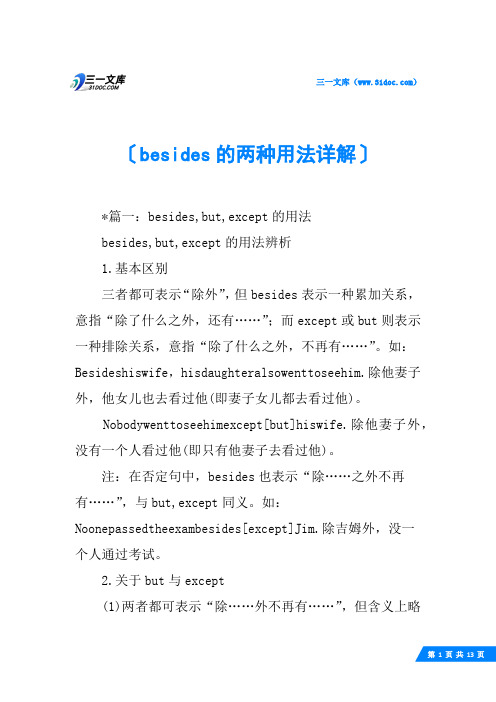
三一文库()〔besides的两种用法详解〕*篇一:besides,but,except的用法besides,but,except的用法辨析1.基本区别三者都可表示“除外”,但besides表示一种累加关系,意指“除了什么之外,还有……”;而except或but则表示一种排除关系,意指“除了什么之外,不再有……”。
如:Besideshiswife,hisdaughteralsowenttoseehim.除他妻子外,他女儿也去看过他(即妻子女儿都去看过他)。
Nobodywenttoseehimexcept[but]hiswife.除他妻子外,没有一个人看过他(即只有他妻子去看过他)。
注:在否定句中,besides也表示“除……之外不再有……”,与but,except同义。
如:Noonepassedtheexambesides[except]Jim.除吉姆外,没一个人通过考试。
2.关于but与except(1)两者都可表示“除……外不再有……”,但含义上略有差别:but侧重指意义的几乎完整性,而except则侧重指后面除去的部分。
比较:Allareherebutone.除一个人都到了。
Allarehereexceptone.还有一个人没到。
(2)在现代英语中,but的介词用法十分有限,一般说来,它只能用在下列词语之后:①no,noone,nobody,nothing,nowhere等②any,anyone,anybody,anything,anywhere等③every,everyone,everybody,everything,everywhere等④all,none等⑤who,what,where等Everyoneknowsitbutyou.除你之外大家都知道。
Ihaventtoldanybodybutyou.除你之外,我没告诉任何人。
Noonebuthe[him]showedmuchinterestinit.除他之外没有一个人对此有很大爱好。
but, except besides 的区别

一、先说except(but)与besides的区别:前者表示"除了……之外(不再有……)",表示的是一种排除的关系;后者表示"除了……之外(还有……)",表示的是一种累加关系:1)Besides his wife,his daughter also went to see him.2)I go to school every day except [but] Sunday.但是以上区别通常只限于肯定句中,在否定句或疑问句中besides也可以表示"除……外,不再有……"(=except):3)No one passed the exam besides [except,but] Jim.除吉姆外,没一个人通过考试。
二、再说except与but的区别:一般说来,前者用法较广,后者用法较窄。
事实上,在现代英语中,but的用法十分有限,通常只能用在no(及其复合词),any(及其复合词),every(及其复合词),all,none,who,what,where 等之后。
一般说来,若没有出现上述词汇,就不宜用but。
如通常不说:4)The window is never opened but in summer(可用except)。
三、except,but一般不用于句首,但besides可用于句首。
四、关于but for与except for:前者表示"若不是",通常与虚拟语气连用;后者表示"除外",指不同类比较5)Do you know any other foreign language_____ English?A exceptB butC besideD besides解答:D.besides,except,but,except for,except that/when的区别如下:********************************************************************* 1)besides表示“除了……以外,还有”。
介词besides,but和except的用法辨析

介词besides,but,except的用法辨析1.基本区别三者都可表示“除外”,但besides表示一种累加关系,意指“除了什么之外,还有……”;而except或but则表示一种排除关系,意指“除了什么之外,不再有……”。
如:Besides his wife,his daughter also went to see him.除他妻子外,他女儿也去看过他(即妻子女儿都去看过他)。
Nobody went to see him except[but]his wife.除他妻子外,没有一个人看过他(即只有他妻子去看过他)。
注:在否定句中,besides也表示“除……之外不再有……”,与but,except同义。
如:No one passed the exam besides[except]Jim.除吉姆外,没一个人通过考试。
2. but与except(1)两者都可表示“除……外不再有……”,但含义上略有差别:but侧重指意义的几乎完整性,而except则侧重指后面除去的部分。
比较:All are here but one.除一个人都到了。
All are here except one.还有一个人没到。
(2)在现代英语中,but的介词用法十分有限,一般说来,它只能用在下列词语之后:①,no one,nobody,nothing,nowhere等no②,anyone,anybody,anything,anywhere等any③,everyone,everybody,everything,everywhere等every④,none等all⑤,what,where等whoEveryone knows it but you.除你之外大家都知道。
I haven't told anybody but you.除你之外,我没告诉任何人。
No one but he[him]showed much interest in it.除他之外没有一个人对此有很大兴趣。
几个“除了”之外的区别

英语中意思为“除了……”的表达有except/except for/besides/apart from/but/but for/other than等,它们的用法复杂多变、难以掌握,学生常常为之困惑烦恼。
本文将对其进行总结、归纳、练习,使学生能够系统地掌握它们的用法,消除学生几多愁。
1. except和besides都可解作“除……之外” 但含义不同。
except表示“从所提到的人或事物中除去,即从整体中除去一部分”,表示递减的概念,含义是否定的。
besides表示“除了……之外,还有……”,指“在整体中加入一部分”,表示递加的概念,含义是肯定的。
试比较:①We all went except him.除他之外,我们都去了。
(他没有去)②We all went besides him.除他之外,我们大家也都去了。
(他也去了)(1)besides常与other/more/else等词连用 except常与all/every/everyone/none/nobody/everything/nothing等总括词连用。
eg. All the students in Class One went to the cinema except Li Ping.(2)若句中没有实义动词do的某种形式 except后接动词不定式 而besides 后接动词的-ing形式。
eg.I had no choice except to obey/besides obeying his order.(3)若句中有实义动词do的某种形式 二者后面都可以接动词原形。
eg.She has nothing to do except/besides go with him.(4)二者后面都可以接从句。
eg.①Besides that he explained the theory he gave us some examples.②He is a good student except that he sometimes comes late to school.(5)except后面可接for(构成短语except for)或其他介词短语,而besides不能。
beside besides except except for but

beside besides except except for but介绍
这些词语在英语中都是用来表示转折或排除的连词,但它们在用法上有一些细微的差别。
1. Beside:
-意义:表示位置、比较、附加。
-例句:She sat beside me during the meeting.
2. Besides:
-意义:表示除此之外、此外、而且。
-例句:Besides English, she speaks three other languages.
3. Except:
-意义:表示例外、除...之外。
-例句:Everyone passed the test except for John.
4. Except for:
-意义:与"except"类似,表示除了...之外。
-例句:All the students, except for Sarah, handed in their assignments on time.
5. But:
-意义:表示转折、但是。
-例句:The weather was cold, but we decided to go for a walk anyway.
总体而言,这些词语在使用时要根据语境来选择,以确保表达的意思准确清晰。
besides, but, except和except for的区别及用法

besides, but, except和except for的区别及用法
(1) besides的含义是“除……之外,还有……”,指的是“已有……另加上”,它往往表示“不少、增多”的意味。
如:
I have five magazines besides this.
除此之外,我还有五本杂志。
(2) but的含义是“除了……之外(再)也没有……”,其后常接名词、代词或动词不定式。
but常用在every, any, no 和由这些词构成的复合词出现的句子中,并放在everything, anywhere, nobody等以及all, who之后。
例如:
Nobody was late but you.
除你之外,没有人迟到。
(3)except 的含义是“除……外”,其后接的词同句子的主语是同类的,指在同类的众多个体中除去一个个体。
(4) except for的含义是“除了……之外”,但常对某种基本情况进行具体的、细节方面的修正,其后所接的词同句子的主语不是同类的,指从整体中除去一个细节,一个方面。
例如:
Your composition is good except for a few spelling mistakes.
你的作文除了少数拼写错误外还是好的。
练习:
[例题]
The streets were deserted______ the policemen on duty.
[A] except [B] except for
[C] but [D] besides
[答案]
B
采编部史春。
介词besides,but,except的用法区别_情态动词 英语语法.doc
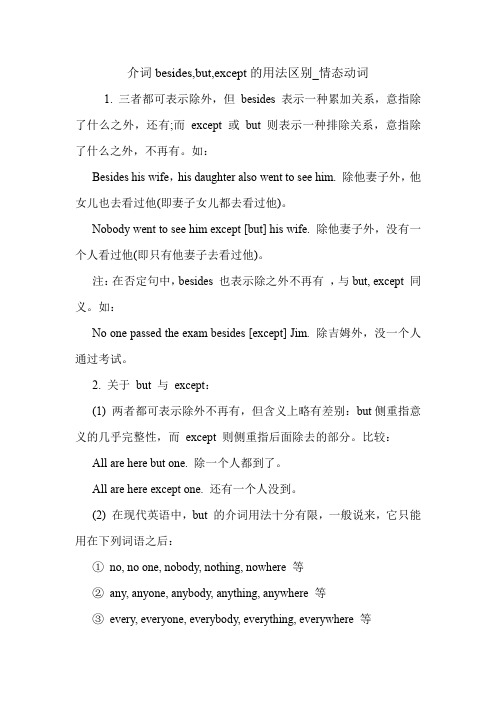
介词besides,but,except的用法区别_情态动词1. 三者都可表示除外,但besides 表示一种累加关系,意指除了什么之外,还有;而except 或but 则表示一种排除关系,意指除了什么之外,不再有。
如:Besides his wife,his daughter also went to see him. 除他妻子外,他女儿也去看过他(即妻子女儿都去看过他)。
Nobody went to see him except [but] his wife. 除他妻子外,没有一个人看过他(即只有他妻子去看过他)。
注:在否定句中,besides 也表示除之外不再有,与but, except 同义。
如:No one passed the exam besides [except] Jim. 除吉姆外,没一个人通过考试。
2. 关于but 与except:(1) 两者都可表示除外不再有,但含义上略有差别:but侧重指意义的几乎完整性,而except 则侧重指后面除去的部分。
比较:All are here but one. 除一个人都到了。
All are here except one. 还有一个人没到。
(2) 在现代英语中,but 的介词用法十分有限,一般说来,它只能用在下列词语之后:①no, no one, nobody, nothing, nowhere 等②any, anyone, anybody, anything, anywhere 等③every, everyone, everybody, everything, everywhere 等④all, none 等⑤who, what, where 等Everyone knows it but you. 除你之外大家都知道。
I haven’t told anybody but you. 除你之外,我没告诉任何人。
No one but he [him] showed much interest in it. 除他之外没有一个人对此有很大兴趣。
几个“除了”之外的区别

英语中意思为“除了……”的表达有except/except for/besides/apart from/but/but for/other than等,它们的用法复杂多变、难以掌握,学生常常为之困惑烦恼。
本文将对其进行总结、归纳、练习,使学生能够系统地掌握它们的用法,消除学生几多愁。
1. except和besides都可解作“除……之外” 但含义不同。
except表示“从所提到的人或事物中除去,即从整体中除去一部分”,表示递减的概念,含义是否定的。
besides表示“除了……之外,还有……”,指“在整体中加入一部分”,表示递加的概念,含义是肯定的。
试比较:①We all went except him.除他之外,我们都去了。
(他没有去)②We all went besides him.除他之外,我们大家也都去了。
(他也去了)(1)besides常与other/more/else等词连用 except常与all/every/everyone/none/nobody/everything/nothing等总括词连用。
eg. All the students in Class One went to the cinema except Li Ping.(2)若句中没有实义动词do的某种形式 except后接动词不定式 而besides 后接动词的-ing形式。
eg.I had no choice except to obey/besides obeying his order.(3)若句中有实义动词do的某种形式 二者后面都可以接动词原形。
eg.She has nothing to do except/besides go with him.(4)二者后面都可以接从句。
eg.①Besides that he explained the theory he gave us some examples.②He is a good student except that he sometimes comes late to school.(5)except后面可接for(构成短语except for)或其他介词短语,而besides不能。
辨析Except ,Besides, but,Except for 之不同
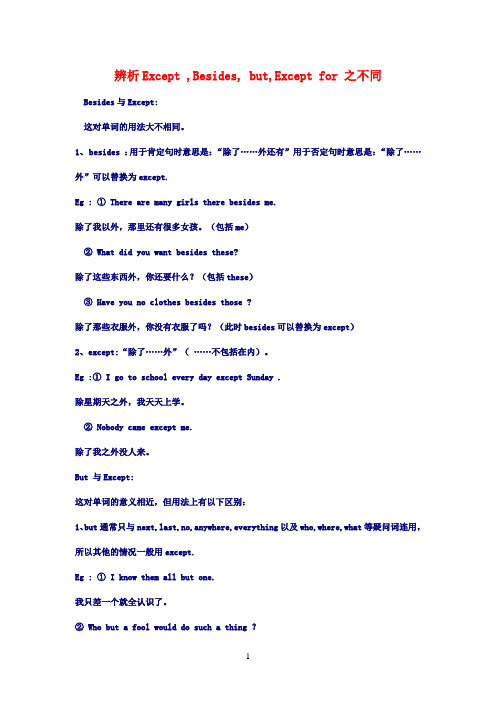
辨析Except ,Besides, but,Except for 之不同Besides与Except:这对单词的用法大不相同。
1、 besides :用于肯定句时意思是:“除了……外还有”用于否定句时意思是:“除了……外”可以替换为except.Eg : ① There are many girls there besides me.除了我以外,那里还有很多女孩。
(包括me)② What did you want besides these?除了这些东西外,你还要什么?(包括these)③ Have you no clothes besides those ?除了那些衣服外,你没有衣服了吗?(此时besides可以替换为except)2、except:“除了……外”(……不包括在内)。
Eg :① I go to school every day except Sunday .除星期天之外,我天天上学。
② Nobody came except me.除了我之外没人来。
But 与Except:这对单词的意义相近,但用法上有以下区别:1、but通常只与next,last,no,anywhere,everything以及who,where,what等疑问词连用,所以其他的情况一般用except.Eg : ① I know them all but one.我只差一个就全认识了。
② Who but a fool would do such a thing ?除了傻瓜谁会做出这样的事情来?2、but强调意义的几乎完整性,except相比之下更强调后面的例外。
Eg :① I have read all the books but one.只差一本这些书我都看完了。
② I have read all the books except one .我还有一本书没看完。
Except for 与Except.这两个词的意义相近,但用法上有以下区别:1.except for 多用于前后有对应词语的句子中,except多用于前后没有对应词语的句子中.Eg :① Your picture is good except for some of the colours.你的画很好,除了有些颜色不好。
but,except, besides的区别

but, except, besides 之间的区别1. 三者都可表示“除外”,但besides 表示一种累加关系,意指“除了什么之外,还有……”;而except 或but 则表示一种排除关系,意指“除了什么之外,不再有……”。
如:Besides his wife,his daughter also went to see him. 除他妻子外,他女儿也去看过他(即妻子女儿都去看过他)。
Nobody went to see him except [but] his wife. 除他妻子外,没有一个人看过他(即只有他妻子去看过他)。
注:在否定句中,besides 也表示“除……之外不再有……”,与but, except 同义。
如:No one passed the exam besides [except] Jim. 除吉姆外,没一个人通过考试。
2. 关于but 与except:(1) 两者都可表示“除……外不再有……”,但含义上略有差别:but侧重指意义的几乎完整性,而except 则侧重指后面除去的部分。
比较:All are here but one. 除一个人都到了。
All are here except one. 还有一个人没到。
(2) 在现代英语中,but 的介词用法十分有限,一般说来,它只能用在下列词语之后:①no, no one, nobody, nothing, nowhere 等②any, anyone, anybody, anything, anywhere 等③every, everyone, everybody, everything, everywhere 等④all, none 等(from )⑤who, what, where 等Everyone knows it but you. 除你之外大家都知道。
I haven’t told anybody but you. 除你之外,我没告诉任何人。
BESIDES,BUT,EXCEPT,EXCEPT FOR的区别
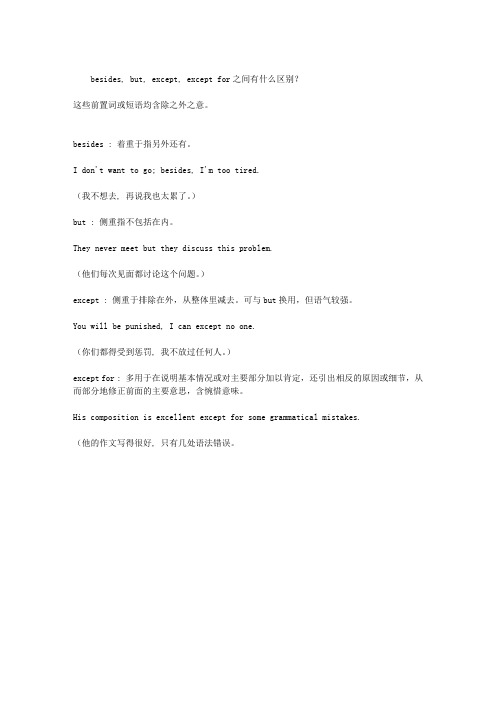
besides, but, except, except for之间有什么区别?
这些前置词或短语均含除之外之意。
besides : 着重于指另外还有。
I don't want to go; besides, I'm too tired.
(我不想去, 再说我也太累了。
)
but : 侧重指不包括在内。
They never meet but they discuss this problem.
(他们每次见面都讨论这个问题。
)
except : 侧重于排除在外,从整体里减去。
可与but换用,但语气较强。
You will be punished, I can except no one.
(你们都得受到惩罚, 我不放过任何人。
)
except for : 多用于在说明基本情况或对主要部分加以肯定,还引出相反的原因或细节,从而部分地修正前面的主要意思,含惋惜意味。
His composition is excellent except for some grammatical mistakes.
(他的作文写得很好, 只有几处语法错误。
besides .but and except的区别
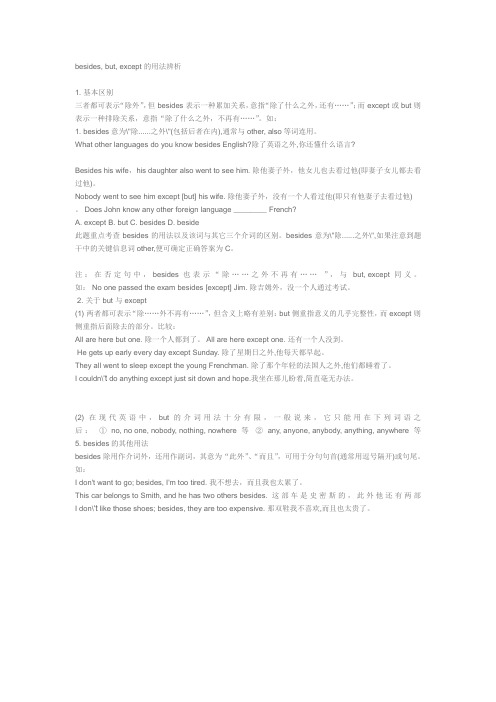
besides, but, except 的用法辨析1. 基本区别三者都可表示“除外”,但 besides 表示一种累加关系,意指“除了什么之外,还有……”;而 except 或 but 则表示一种排除关系,意指“除了什么之外,不再有……”。
如:1. besides意为\"除......之外\"(包括后者在内),通常与other, also等词连用。
What other languages do you know besides English?除了英语之外,你还懂什么语言?Besides his wife,his daughter also went to see him. 除他妻子外,他女儿也去看过他(即妻子女儿都去看过他)。
Nobody went to see him except [but] his wife. 除他妻子外,没有一个人看过他(即只有他妻子去看过他)。
Does John know any other foreign language ________ French?A. exceptB. butC. besidesD. beside此题重点考查besides的用法以及该词与其它三个介词的区别。
besides意为\"除......之外\",如果注意到题干中的关键信息词other,便可确定正确答案为C。
注:在否定句中,besides 也表示“除……之外不再有……”,与but, except 同义。
如: No one passed the exam besides [except] Jim. 除吉姆外,没一个人通过考试。
2. 关于 but 与 except(1) 两者都可表示“除……外不再有……”,但含义上略有差别:but侧重指意义的几乎完整性,而 except 则侧重指后面除去的部分。
比较:All are here but one. 除一个人都到了。
除了……用法

except, besides, except for,but用法的关联和区别:1.作介词用法时,这四个词都有“除……之外”的含义;2.Except “从整体中除去一部分”:①加宾语,常与do, does, have, has, had nothing, all, everything, everyone, nothing, nobody等连用,②与介词连用,这时相当于except + that-clause (从句)1)All the students have passed the exam except Tim.2)He did nothing except watch TV yesterday.3)The weather is fine today except in the northwest.= The weather is fine today except it is in the northwest.3.Besides 作“除……之外”时,表示“另外附加”的含义。
相当于“in addition to”。
1)We all went to the cinema besides our teacher.4.Except for = but for “要不是”,表示美中不足;(Expect 后排除的内容与主语往往时同类的,而except for 后所排除的内容与主语往往不是同一类的.)1)All the buildings are excellent except this one.2)All the buildings are excellent except for their location.5.but 后面可加n., prep., to do, do, but for1)I have nothing but friends.2)I have told nobody but you.3)In cold winter, the bears have no choice but to lie down and sleep.4)She had nothing to do but cry.5)But for your help, I couldn’t have finished my work so early.【练习】1.I know nothing about the young lady _______ she is from Beijing.A. exceptB. except forC. except thatD. besides2.He did have nothing to eat but _______.A. to steal some food from the shopB. to rob some food of the shopC. steal some food from the shopD. rob some food of the shop3.Jane was quite alone in the world _______ an aunt in Brazil.A. exceptB. except forC. besidesD. instead of4.He gets up early every day ______ Sunday.A. besidesB. except forC. except thatD. except5.We need fifteen more people ______ our team to do the job.A. besidesB. except forC. except thatD. except。
but except 的区别

besides , except, except for , but 用法辩异Beside ,except, except for 和but 用作介词时都表示“除。
外”,但意义和用法有同有异。
一、besides与except1、在肯定句中,besides “除…,之外(还有)”解,其宾语被包括在内.except 作“除去。
之外”解,表示“排除”意义,其宾语不包括在内。
2、在否定句中,besides和except意义相同。
全局的意义是否定的,而他们后边的宾语却是被肯定的对象。
比较而言,besides在否定句中不如except 常用。
因此,不少人对这一用法不熟悉,甚至1987年成人高考试题中的命题者也出现了失误:He is a strange man. He has no friends _____you.A. FromB. besides c. except D. with命题者给的正确答案是c,实际上是B也是正确答案。
在下面的例句中,beside s 的意义均与except 相同。
She has no relations besides an aged aunt.除了一个老年的姑母以外他没有灭的亲戚。
No living creature ever walks in it besides the chaplain. 除了牧师,没有人在里面走过。
He had few friends besides us.除了我们外他没有什么朋友。
We have no other tools besides this.Besides you , no one is qualified.初你之外没有人合格。
3、在疑问句中,besides 和except 有时意义相同,可以换用。
例如:Do you have any other books besides/except these two? 除了这两本书,你还有别的书吗?Have you nothing to tell us besides what we have already heard?Have you no clothes besides those?4、在besides后面,用作宾语的有名词、代词、动名词和不定式。
besides的两种用法详解

All compositions are well written except yours.除了你的作文外,其他的作文都写得很好。
His composition is good except for a few spelling mistakes.他的作文写得不错,只是有几处拼写错误。
正:Everyone but (except) me is tired.
误:But (Except) me, everyone is tired.
注:except for可用于句首,表示except的意思:
正:Except for me, everyone is tired.
3.关于except与except for:
I haven't told anybody but you.除你之外,我没告诉任何人。
No one but he [him] showed much interest in it.除他之外没有一个人对此有很大爱好。
一般说来,若没有出现上述词汇,就不宜使用介词but,否则可能造成错句。但是except却没有以上限制。比较:
I don't want to go; besides, I'm too tired.我不想去,而且我也太累了。
This car belongs to Smith, and he has two others besides.这部车是史密斯的,此外他还有两部。
篇二:由一道高考题透析besides的用法
由一道高考题透析besides的用法
看下面一道高考单项填空题:
Does John know any other foreign language ________ French?
Except、except for、besides 与but的用法区别

Except、except for、besides 与but的用法区别There are some rich men Ma Yun.A.exceptB.except forC.BesidesD.but除了马云,中国还有其他的富翁。
选择哪一个答案?Except, except for, besides和but,这四个词都有“除……之外”的意思,而且四个词都是介词,很多同学总是搞不清楚它们之间的用法区别。
1. exceptExcept表示“排除在外”,什么意思呢?我们先来看一个例句:Everyone in our class went to the cinema yesterday except Tom. 昨天,除了汤姆以外,我们班的每个人都去看了电影。
大家都去了,但就汤姆没有去,也就是说,在去看电影人的当中,没有汤姆,汤姆被排除在外了。
又如,我们要表达“除了星期天,他们天天都要工作”,工作的日子一周有六天,星期天是被排除在外的,所以,它的英语就是:They work every day except Sunday.2. besidesBesides表达的意思正好与except相反,它表示“包含在内”,意思就是说,除了某人做某事以外,别人也做了某事,大家都做了。
例如:I have some other friends besides you and your family. 除了你和你的家人之外,我还有其他一些朋友。
这句话中,“我的朋友”是包含了“you and your family”的,并没有把你和你的家人排除在我的朋友范围以外,这就叫包含在内。
这时就不能用except了。
又如“除了两本故事书以外,他还买了三本英语书”这句话,在他所买的书中,包含了两本故事书,而并不是排除了故事书,所以这句话的英语表达是:He bought three English books besides two story books.。
- 1、下载文档前请自行甄别文档内容的完整性,平台不提供额外的编辑、内容补充、找答案等附加服务。
- 2、"仅部分预览"的文档,不可在线预览部分如存在完整性等问题,可反馈申请退款(可完整预览的文档不适用该条件!)。
- 3、如文档侵犯您的权益,请联系客服反馈,我们会尽快为您处理(人工客服工作时间:9:00-18:30)。
我们所有人,甚至对这个主题有所了解的人,都必须认真学习。
All my brothers come here every day, always excepting the youngest.
除了最小的弟弟总是不来,我所有的兄弟每天都来。
(5)but与except同义,但but多用在every、any、no等和由这些词构成的复合词如everything、anywhere、nobody等词以后及all、none之后。
第 1 页,共 2 页
除了他弟弟外,他们都是对的。 Everyone, not excepting myself, must share the blame. 每个人,我自己也不例外,都必须分担咎责。
All of us, without excepting those who know more about the subject, should study.
3
点击朗诵16国外语:需要启用宏后才能使用朗诵功能
启用方法:先启用编辑,然后启用宏内容。2003版启用方法如下: 工具→宏→安全性→低或中→重启文档→启用宏)
31353
不会启用宏?点击查看帮助: office2003帮助 请根据内容选择以下语种,再点击单词朗诵,祝你学习进步!
1
英语
en
韩国语
法语
日语 泰语
例如: The children go to school everyday but Sunday. 除了星期天,孩子们每天都要去上学。 They are all gone but me. 除我之外,他们都去了。 You can get the book anywhere but here. 除了这里,你可以在任何地方得到这本书。 There is no one but me. 这里除我之外没有别人。 Who but George would do such a thing? 除了乔治,谁会做这种事?
他的作文写得不错,就是有一些拼写错误。
a few spelling mistakes(除去的)和His essay(非除去的)是不同类的事物。
(3)apart from 具有多重意义:既可表示besides,也可以表示exept或exept for,还可以表示without的意思。
例如:
Apart from the problem of money, it will take a lot of time.(=besides)
除了钱的问题外,这件事情还很费时间。
The orphan had no one to take care of him apart from his uncle.(=except)
除了他叔叔,没人照顾这个孤儿。
He has done good work, apart from a few slight faults.(=except for)
除去一些小失误,他的工作做得很好。 There can be no knowledge apart from practice.(=without) 实践出真知.
(4)excepting =except,但一般用于句首或用于not、without、always等词之后
例如: Excepting his brother, they are all right.
德语 越南语
葡萄牙语 西班牙语 阿拉伯语 中文 世界语 塞尔维亚语
瑞典语
南非荷兰语 捷克语
Besides、But、Except (1) besides与except
前者表示“除„„以外,还有„„”;后者表示“从整体中除去„„”
这个大家都知道,就不举例子了。 (2)except与except for a.除去的和非除去的是同类事物,用except。 例如: All the essays are well written except Nelson's. 除了尼尔森外,其他人的作文都写得很好。
Nelson的文章(除去的)和All the essays(非除去的)是同类事物,所以用except。
b.除去的和非除去的不是同类事物,用except for,并且从语气上通常表示遗憾。
例如:His essay is well written except for a few spelling mistakes.
第 2 页,共 2 页
